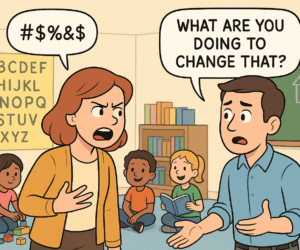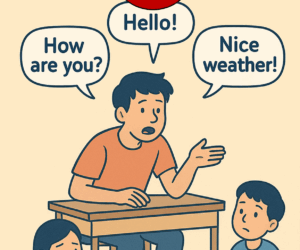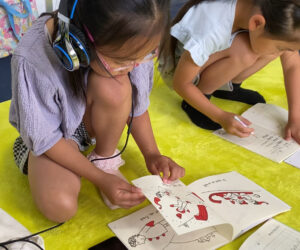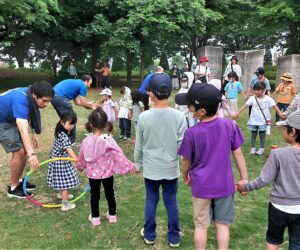or, Things Not to Do/Say During Your Demo Day, Part 1
Let’s start with 3 premises that we can all get behind:
- Looking for a new job is stressful.
- Stress can make us do silly things.
- Silly things in a limited context can turn into embarrassing things.
As a part of MY’s hiring team, I’ve hosted demo teachers in my lessons for over 5 years. I have probably had over 40 teachers from all over Japan observe my lessons and teach my students.
The vast majority of candidates are respectful and professional. I’ve also had a few special cases that are worth mentioning. Silly words and actions may have been said and done as a result of stress. However, due to the limited time of getting to know the candidate, the interviewer’s impression of you can quickly be tarnished. I believe that talking about the examples will be useful not only for your potential demo day at MY, but at any other place of future employment.
- “Your female teachers should smile more.”
This gem did not come in the actual stress of the interview or demo day, but afterward. I decided not to hire a male candidate who was overqualified and yet wasn’t able to apply any of his loudly professed qualifications to practice. To be clear, even though I believed that this teacher may be a poor fit for MY, I thought that maybe I could recommend him to someone from tertiary levels of education. At MY, we sometimes recommend teachers to other positions that we think would be a better fit.
However, the candidate responded to rejection at MY with several inappropriate comments, including this one targeted at MY’s female staff. Needless to say, after hearing that I should “smile more,” my desire to help out immediately vanished.
Why is telling women to “smile, honey” inappropriate? Here are some facts for you:
- One survey found that 98 percent of women have been told to smile at work at some point in their lives by a male superior.
- 15 percent of women report that it happens at least weekly.
- Even though the “Resting B*tch Face,” also known as “RBF,” is real and it happens in men as often as women, it is still used disproportionately to describe women.
- Female professors are rated more harshly than their male peers on things like classroom demeanour, which means the stakes of “not smiling enough” become very high.
A comment that all staff need to smile more may be valid criticism. Even without the data above, though, thinking that in 2023 women are to “smile more” is, to be frank, obsolete. And I know – currently, it may be tricky to navigate gender relationships in the office, but I follow this rule that’s been useful for me:
If you can’t imagine saying a phrase to a member of the opposite sex, maybe you shouldn’t say it at all.
In other words, saying, “Cheer up, dude!” is appropriate for both sexes. However, if you say, “Smile, honey,” to your male coworker, and he goes “Eeeeww, mate, what?” – don’t say it to your female coworker either.
- “You’re, like, everything I wanted to be in high school!”
Navigating what to say to your interviewer and the person in charge of your demo day is quite tricky. Forbes, for example, has this to say regarding what not to say during your job interview.
To the Forbes list, I’d also like to add that phrases like “I am so honoured to be here” and “This is my dream job” may make the interviewer doubt how truthful you are. Especially if you haven’t done any research about the company (this particular candidate had no idea about MY’s teaching methodology or fundamental ideas of constructivism), how can you know that this is your dream job?
“You’re, like, everything I wanted to be in high school!” came up after other questionable compliments that I mention above. It immediately raised a red flag for me. Giving compliments to the company or your interviewer is not forbidden, but you need to strike a balance between a compliment and sucking up. The emptiness of this particular phrase made it sound like the person was trying too hard to flatter me. The candidate simply blurted this phrase out with no additional context. Why did they think so? What did they mean by it? I still don’t know.
One of the most important elements of genuine compliments is sincerity and specificity. Praise efforts and achievements, but you do need to actually mean it. At the end of the day, don’t forget that a few cringey poems didn’t save Jane Bennet’s relationship with her admirer!
- “So, can I get another job while I work here?”
One thing recruiters look for is commitment. Especially when you start at a new company, you have a myriad of things to learn, from official company policies to whom to befriend and go to karaoke with. You may truly be a multitasking Renaissance man that can juggle several jobs and speak French in 90 days. However, let’s be honest, the likelihood of this is very low. Considering MY’s intense training process and the background knowledge that you will need to be successful in the classroom, focus on one job at a time.
You can have a second job while working at MY. We’ve had several teachers hold part-time positions as adjunct professors at local universities, and they were successful in figuring out a balance between their personal life, employment at MY, and employment at a university. Even so, they spent two to three years improving their teaching skills before even having a conversation with the management about getting another job.
So, what if you do need to get another job? The most “genius” idea is to not tell anyone about your second place of employment. However, in Japan, it’s not a great plan not to inform your employer or immigration. If you don’t get a special permit 資格外活動許可許, “Permission to engage in activities other than permitted under the status of residence” and you get caught, you may get in serious trouble with immigration. To obtain the permit, you may need your employer’s expressed written permission.
Start your new job and see your workload after you start teaching on your own. If you are struggling to keep your main job, maybe you shouldn’t consider getting another one. If you’re doing just fine and need another job – congratulations, you may start looking for another employment opportunity. Just remember that you must be transparent with your employer and make sure that you compartmentalize and find a way to do both of your jobs to the best of your abilities. If your second job affects your performance at your main job, your employer may recall their permission. No main job means that you may not be able to obtain your immigration permit again. If you want to read more about having a part-time job while employed full-time, I recommend reading this article.
This is Part 1 of things not to do/say when looking for a job. Let us know if you want to read Part 2, and good luck with your job search!











